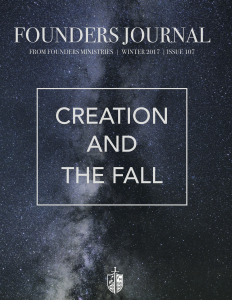This issue of the Founders Journal gives expression to the doctrine that is contained in chapters 4 and 6 of the Second London Confession, the important topics of Creation, Fall, Sin, and its Consequences. Pat Stewart has contributed an astute examination of the perennially intriguing, and controversial, biblical teaching on Creation. Topics with which he deals included the following:
- Creation as involved in God’s decree and as a necessary pre-requisite to the implementation of the Covenant of Grace
- Affirmation of six-days creation with supporting biblical evidence
- A representative survey of the biblical contexts in which God is presented as creator
- How this work expresses the biblical teaching on the Trinity
A second article, written by Tom Nettles, looks at man in the unfallen state and seeks to explore how the first sin arose in Eden. In this we see the importance of a historical Adam and Eve for the entirety of biblical revelation, the character of unfallenness, which includes, but is not limited to, innocence. We see also that they were endowed with positive “knowledge, righteousness, and true holiness.” Though expressed as a positive command not to eat, what was truly at stake was obedience to the law written on the heart (“the law of their creation”). How did the couple unfallen and thus unpredisposed-to-sin find themselves adhering to the words of Satan and disobey the Living God?
Steve Farish explores the Confession’s propositions on guilt, condemnation, and corruption. He looks at Adam as covenantal head of the race and our consequent guilt and condemnation through his sin as well as Adam as the natural head of the race and our consequent corruption. What is the relation between these two and what lessons of hope and gratitude do we derive from a proper construction of the relation between these biblical ideas?
Curt Daniel has contributed an article that gives a deeper exploration of the prevailing influence of corruption. In giving a striking view of the images and analogies of Scripture on that subject, supported by poignant observations from godly theologians through the years, he points to our corruption as an element of the punishment, the initial infliction of death, and thus, not the source of our original guilt but the result of it. Corruption also is the fountain from which all actual transgression flows, and constitutes indwelling sin that will not be removed until death.
Mark Coppenger has contributed a review of a book relevant to this subject, taking a look at the recently released Searching for Adam: Genesis & the truth About Man’s Origin edited by Terry Mortenson (Green Forest, AR: New Leaf Publishing Group, 2016).






















